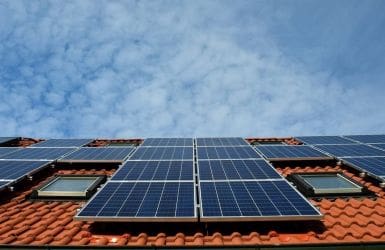
Solar panels insurance
Solar panels are covered under your buildings insurance if they are attached to the house. Otherwise they fall under your contents insurance. It is therefore not necessary to insure your solar panels separately. The coverage and conditions can differ from one insurer to another.
Calculate your premiumContents insurance or home insurance?
Whether you choose building insurance or contents insurance to insure your solar panels depends on how they are attached.
Solar panels building insurance
Solar panels are covered by buildings insurance if they are attached to your roof. With flat roofs, they may not be attached. In that case, they are not part of your house and are not covered by buildings insurance.
Solar panels contents insurance
Are the solar panels not attached? Then they are covered by your contents insurance. Pay close attention to this. In fact, different or stricter conditions apply because the solar panels are outside the house.
Differences insurance requirements rental or owner-occupied property
How best to insure your solar panels also depends on whether you have a rental or owner-occupied home.
For Sale Apartment
Do you have an owner-occupied apartment with solar panels? Then the Owners' Association (VvE) may be partially responsible for the insurance. Did you add the solar panels yourself? Then you can self-insure them with the owner's interest in your contents insurance.
Rental property
In a rental property, solar panels are often covered under tenant's interest and under your contents insurance. Check if your solar panels insurance is necessary for additional durable living convenience. Separate coverage is sometimes required for full indemnity. If in doubt, compare the options within your home insurance policy or contact us.
Property insurance coverage for solar panels
Are your solar panels covered under your buildings insurance? According to the basic policy, most insurers will at least cover you against:
- Hail. Large hailstones can crack or shatter the glass layer of panels.
- Fire. Fire in or around the home can also affect or melt solar panels.
- Theft. Especially in easily accessible installations such as a shed or extension, panels can be stolen.
- Break-in damage. Attempted theft or vandalism may damage panels or wiring
- Lightning strikes. Direct strikes or voltage spikes caused by lightning can cause electrical damage.
- Storm damage. Severe winds can tear panels loose or damage roof structures, also damaging the panels.
Own risk
The deductible is important for covering damage to solar panels in a homeowners insurance policy or homeowners insurance policy. In the event of damage, such as from storms or hail, you must first pay the deductible before receiving compensation from the insurer.
Exclusion
Invisible damage is often difficult to claim. For example, small cracks (microcracks) are usually excluded from coverage. They reduce energy production without you seeing it.
Terms and conditions building insurance solar panels
When insuring solar panels, keep conditions in mind. We highlight 3 of them.
1
Solar panels part of your home
Want to include your solar panels in your homeowners insurance? Then make sure they are nailed down. This means that it is not possible to just take them away. They must actually be attached to your home.
2
Home value with solar panels
Have the value of your home rechecked. When you install solar panels, the value will go up. This means you are underinsured with your old insurance. Be sure to adjust your insurance or buy new insurance. You will then usually pay a slightly higher premium.
3
Exceptions for product damage and improper installation
See what types of damage your insurer will cover. Most insurers have strict exceptions, such as damage due to improper installation, poor maintenance and costs due to breakdowns. Always check the policy to see if product damage is included in the insurance. This deals with lost electricity from damaged solar panels.
Lost power output due to damage to your solar panels
Lost electricity revenue due to damage to solar panels can be co-insured in some cases, but this is not standard. Building insurance usually only covers damage to the panels themselves, not the lost income.
Some insurers offer additional coverage or separate solar panel insurance for this. This temporarily compensates the loss of yield, often up to a certain maximum. It is therefore wise to read the terms and conditions carefully.
Tips to prevent damage to your solar panels
Prevent damage to your solar panels with the following important tips and advice:
- Choose a licensed installer when installing your solar panels. This ensures safe and professional mounting and reduces the risk of falling panels.
- Regularly check the condition of your solar panels for damage and invisible damage, such as microcracks, which may not be visible to the naked eye but can affect yields.
- Perform proper maintenance, including regular cleaning of the panels to remove dirt and deposits. This not only helps prevent damage, but also increases efficiency.
- Be careful, for example, not to place heavy objects on or around the panels that could cause damage.
- See if you need liability insurance for individuals. Especially if your panels may cause damage to third parties.
Property insurance comparison
Need buildings insurance for your home with solar panels? Compare building insurance policies on coverage and premium. This makes it easy to find the best deal for your situation.
Frequently asked questions about solar panel insurance
What is the best way to co-insure my solar panels?
Solar panels are best insured under your home insurance policy. The added value of the solar panels is then added to the previously calculated value of your house. Or choose home insurance: the combination of buildings insurance and home contents insurance.
We can be reached via chat, WhatsApp, phone or email
Questions? Contact us if you want to know more.
We are here today until 6 p.m.
